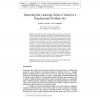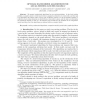113 search results - page 1 / 23 » Determining the Significance of Item Order In Randomized Pro... |
EDM
2009
13 years 2 months ago
2009
Researchers who make tutoring systems would like to know which sequences of educational content lead to the most effective learning by their students. The majority of data collecte...
AIED
2009
Springer
13 years 11 months ago
2009
Springer
Researchers that make tutoring systems would like to know which pieces of educational content are most effective at promoting learning among their students. Randomized controlled e...
EOR
2007
13 years 4 months ago
2007
The knapsack problem (KP) is generalized to the case where items are partially ordered through a set of precedence relations. As in ordinary KPs, each item is associated with proļ...
SIGMOD
2008
ACM
14 years 5 months ago
2008
ACM
Discovering a bucket order B from a collection of possibly noisy full rankings is a fundamental problem that relates to various applications involving rankings. Informally, a buck...
STOC
1990
ACM
13 years 9 months ago
1990
ACM
We present randomized algorithms for two sorting problems. In the local sorting problem, a graph is given in which each vertex is assigned an element of a total order, and the task...


